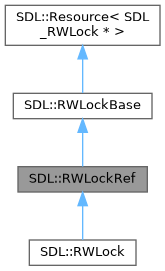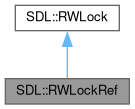Semi-safe reference for RWLock.


Public Member Functions | |
| RWLockRef (RWLockParam resource) noexcept | |
| Constructs from RWLockParam. More... | |
| RWLockRef (RWLockRaw resource) noexcept | |
| Constructs from RWLockParam. More... | |
| constexpr | RWLockRef (const RWLockRef &other) noexcept=default |
| Copy constructor. | |
| ~RWLockRef () | |
| Destructor. | |
| constexpr | RWLock (std::nullptr_t) noexcept |
| Default ctor. | |
| constexpr | RWLock (const RWLockRaw resource) noexcept |
| Constructs from RWLockParam. More... | |
| constexpr | RWLock (const RWLock &other) noexcept=default |
| Copy constructor. | |
| constexpr | RWLock (RWLock &&other) noexcept |
| Move constructor. | |
| constexpr | RWLock (const RWLockRef &other)=delete |
| constexpr | RWLock (RWLockRef &&other)=delete |
| RWLock () | |
| Create a new read/write lock. More... | |
 Public Member Functions inherited from SDL::RWLock Public Member Functions inherited from SDL::RWLock | |
| constexpr | RWLock (std::nullptr_t) noexcept |
| Default ctor. | |
| constexpr | RWLock (const RWLockRaw resource) noexcept |
| Constructs from RWLockParam. More... | |
| constexpr | RWLock (RWLock &&other) noexcept |
| Move constructor. | |
| constexpr | RWLock (const RWLockRef &other)=delete |
| constexpr | RWLock (RWLockRef &&other)=delete |
| RWLock () | |
| Create a new read/write lock. More... | |
| ~RWLock () | |
| Destructor. | |
| constexpr RWLock & | operator= (RWLock &&other) noexcept |
| Assignment operator. | |
| constexpr RWLockRaw | get () const noexcept |
| Retrieves underlying RWLockRaw. | |
| constexpr RWLockRaw | release () noexcept |
| Retrieves underlying RWLockRaw and clear this. | |
| constexpr auto | operator<=> (const RWLock &other) const noexcept=default |
| Comparison. | |
| constexpr | operator bool () const noexcept |
| Converts to bool. | |
| constexpr | operator RWLockParam () const noexcept |
| Converts to RWLockParam. | |
| void | Destroy () |
| Destroy a read/write lock created with RWLock.RWLock(). More... | |
| void | LockForReading () |
| Lock the read/write lock for read only operations. More... | |
| void | LockForWriting () |
| Lock the read/write lock for write operations. More... | |
| void | TryLockForReading () |
| Try to lock a read/write lock for reading without blocking. More... | |
| void | TryLockForWriting () |
| Try to lock a read/write lock for writing without blocking. More... | |
| void | Unlock () |
| Unlock the read/write lock. More... | |
Additional Inherited Members | |
 Protected Member Functions inherited from SDL::RWLock Protected Member Functions inherited from SDL::RWLock | |
| constexpr | RWLock (const RWLock &other) noexcept=default |
| Copy constructor. | |
| constexpr RWLock & | operator= (const RWLock &other) noexcept=default |
| Assignment operator. | |
Constructor & Destructor Documentation
◆ RWLockRef() [1/2]
|
inlinenoexcept |
- Parameters
-
resource a RWLockRaw or RWLock.
This does not takes ownership!
◆ RWLockRef() [2/2]
|
inlinenoexcept |
- Parameters
-
resource a RWLockRaw or RWLock.
This does not takes ownership!
Member Function Documentation
◆ RWLock() [1/2]
|
inline |
A read/write lock is useful for situations where you have multiple threads trying to access a resource that is rarely updated. All threads requesting a read-only lock will be allowed to run in parallel; if a thread requests a write lock, it will be provided exclusive access. This makes it safe for multiple threads to use a resource at the same time if they promise not to change it, and when it has to be changed, the rwlock will serve as a gateway to make sure those changes can be made safely.
In the right situation, a rwlock can be more efficient than a mutex, which only lets a single thread proceed at a time, even if it won't be modifying the data.
All newly-created read/write locks begin in the unlocked state.
Calls to RWLock.LockForReading() and RWLock.LockForWriting will not return while the rwlock is locked for writing by another thread. See RWLock.TryLockForReading() and RWLock.TryLockForWriting() to attempt to lock without blocking.
SDL read/write locks are only recursive for read-only locks! They are not guaranteed to be fair, or provide access in a FIFO manner! They are not guaranteed to favor writers. You may not lock a rwlock for both read-only and write access at the same time from the same thread (so you can't promote your read-only lock to a write lock without unlocking first).
- Postcondition
- the initialized and unlocked read/write lock or nullptr on failure; call GetError() for more information.
- Since
- This function is available since SDL 3.2.0.
◆ RWLock() [2/2]
|
inlineexplicitconstexprnoexcept |
- Parameters
-
resource a RWLockRaw to be wrapped.
This assumes the ownership, call release() if you need to take back.
The documentation for this struct was generated from the following file:
- SDL3pp/SDL3pp_mutex.h